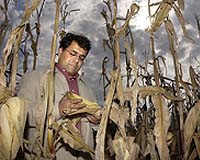 |
Rome (AFP) Sept 1, 2010 Pakistani farmers are in desperate need of wheat seeds for the next sowing season after floods devastated much of the country's farmland and seed stock, the UN's Food and Agriculture Organisation said on Wednesday. "Unless people get seeds over the next few weeks they will not be able to plant wheat for a year," said Daniele Donati, director for FAO emergency operations in Asia, the Middle East and Europe. "Food aid alone will not be enough. If the next wheat crop is not salvaged, the food security of millions will be at risk," Donati warned. The FAO called for more international aid to save the upcoming wheat planting season. The agency said it had distributed seeds to 200,000 families and that it planned to double that number "if additional funding is committed soon," a statement said. The floods have engulfed a fifth of the country, ruining 3.6 million hectares (8.9 million acres) of rich farmland and affecting 17 million of Pakistan's 167 million people.
earlier related report "The food crisis, which was both a priority and an emergency for us, is now under control thanks to a surge of national solidarity and the support of the international community," Danda told reporters. The interim prime minister, who also spoke to foreign diplomats during a meeting on poverty, also "thanked all those who had joined Niger in getting this difficult situation over food under control." "Nevertheless the consequences of this crisis will take time to clear away," Danda said, recalling that "a large proportion of the affected population has lost all its means of production." More than seven million people in Niger face food shortages in a serious crisis brought on by a major shortfall in the crop harvest for 2009-2010, according to the United Nations. The United Nations said it had allocated 35 million dollars (27.3 million euros) to help the affected populations. Niger has also been hit by major floods since the beginning of August that have turned three districts in the capital Niamey into marshland. "It's a double catastrophe: before the rain, the people lacked food, now the few reserve stocks of cereal have been washed away by the water." Ibrahim Mahaman said, a village chief cited by the Oxfam aid organisation. The UN has registered more than 17,000 homeless people in the capital. Only half of them, currently sheltered in schools, have received food, blankets and mosquito nets provided by international organisations.
Share This Article With Planet Earth
Related Links Farming Today - Suppliers and Technology
 Growing Drought-Tolerant Crops Inching Forward
Growing Drought-Tolerant Crops Inching ForwardMilwaukee WI (SPX) Aug 31, 2010 A collaborative team of scientists led by researchers at The Medical College of Wisconsin, in Milwaukee, has used the tools of structural biology to understand how a synthetic chemical mimics abscisic acid (ABA), a key stress hormone that helps plants cope with adverse environmental conditions such as drought. The results are published online in Nature Structural and Molecular Biology in a ... read more |
|
| The content herein, unless otherwise known to be public domain, are Copyright 1995-2010 - SpaceDaily. AFP and UPI Wire Stories are copyright Agence France-Presse and United Press International. ESA Portal Reports are copyright European Space Agency. All NASA sourced material is public domain. Additional copyrights may apply in whole or part to other bona fide parties. Advertising does not imply endorsement,agreement or approval of any opinions, statements or information provided by SpaceDaily on any Web page published or hosted by SpaceDaily. Privacy Statement |